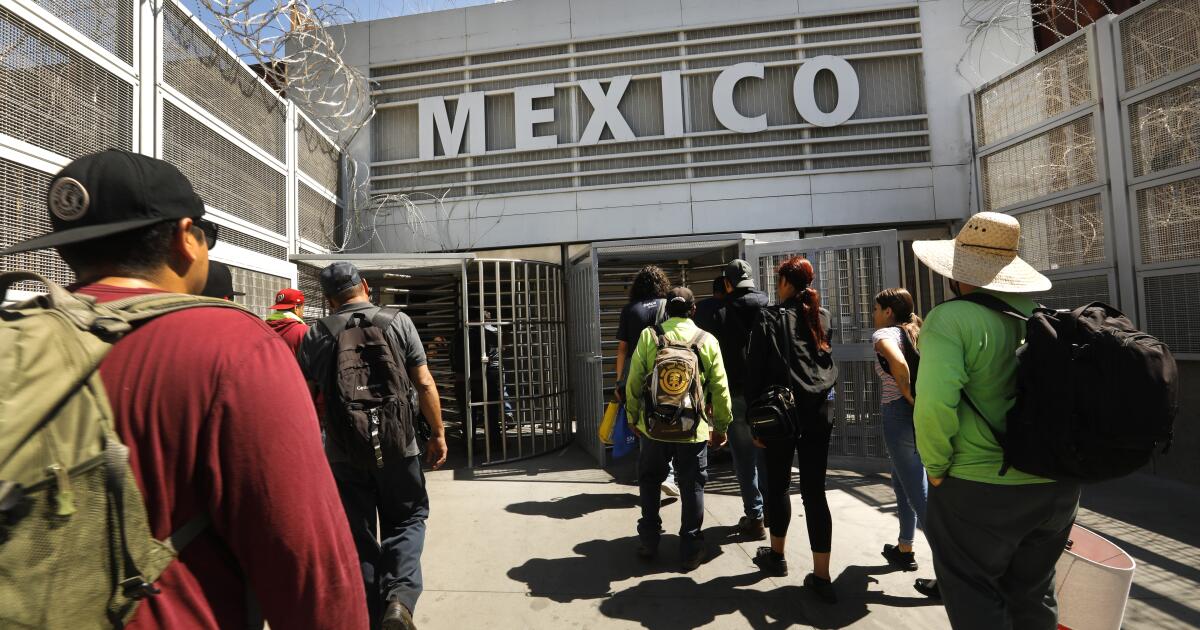President-elect Donald Trump has made clear his intent to supercharge his “America First” approach to foreign policy in his second term — and Mexico looks set to be at the tip of the spear.
While many of Trump’s predecessors have also followed a “realist” strategy — that is, one in which relative power is at the forefront of international relations and diplomatic success is viewed through how it benefits one’s own nation — the incoming president has displayed an apparent unwillingness to consider the pain that his plans would inflict on targeted countries or the responses this will engender.
Trump’s proposed policies threaten Mexico in three key ways: First, his goal of deporting millions of migrants would put tremendous pressure on Mexico’s economy and society as the country tried to absorb the influx. This would be exacerbated by his second threat, a sharp increase in tariffs, which could devastate the critical export sector of Mexico’s economy. And third, Trump has floated the idea of using U.S. military power to confront narcotraffickers within Mexico — which would directly impinge on Mexico’s sovereignty and could generate more violence on both sides of the border.
But Mexico has several options to push back on Trump by imposing high costs on U.S. interests.
Indeed, Mexican President Claudia Sheinbaum has already signaled how she may counter Trump’s policies. The most obvious tools are ending cooperation on drugs and immigration and imposing tariffs of her own. She could also revoke some of the decades-old tax and labor privileges that have benefited U.S. businesses operating within Mexico. And finally, she could play the “China card” — that is, in the face of worsening U.S.-Mexico ties, Mexico could turn to Washington’s biggest economic rival at a time when Beijing is seeking to assert more influence across Latin America.
Sheinbaum has said she wants to avoid a trade war, but Trump’s threats have led her nonetheless to talk about how a trade war would begin. This trade war, plus other costs Sheinbaum could impose on U.S. investors, would also likely foment a coalition of opposition within the U.S.
If Trump abrogates trade deals and imposes tariffs, he might convince investors to spend their next dollars in the U.S. But if Mexico imposes tariffs, business taxes or investment restrictions, what would happen to investors’ farms and factories already in Mexico?
Past experience suggests that any disruption to supply chains or U.S. export markets would awaken strong business opposition, as analysts and business groups have already recognized.
Trump is not immune to pressure from U.S. businesses. During his first administration, companies successfully opposed Trump’s attempt to close the border, arguing that slowing the flow of immigrants also meant slowing trucks full of goods.
On the issue of border and immigration, while Trump has issued threats, Sheinbaum has stressed the importance of cooperation.
Currently the Mexican government expends significant resources to patrol its own southern border, not to mention dealing with the many potential migrants who gather in its northern cities.
Mexico could demand more support from the U.S. in exchange for this work plus the costs associated with welcoming back the estimated 4 million Mexicans who are currently in the U.S. without proper documentation.
The deportation of undocumented immigrants that Trump has repeatedly promised would require other types of cooperation, such as processing border crossings, and Mexico could slow-walk this process. Mexico has already signaled that it will withhold processing of non-Mexicans.
The two countries have a history of collaboration in addressing the illegal drugs trade — but here too there have also been tensions. For example, toward the end of Trump’s first term, a Mexican general was arrested in the U.S. on drug charges. After a diplomatic uproar, he was returned to Mexico and released.
In late November, Sheinbaum noted that she and Trump had discussed security cooperation “within the framework of our sovereignty.” But Trump’s campaign rhetoric seemed less concerned with Mexico’s sovereignty, floating the idea of sending troops to the border or even deploying them within Mexico to counter narcotraffickers. That would clearly enrage Mexico, with consequences that would extend far beyond a willingness to cooperate on the issues of drug trafficking.
One country that stands to benefit should U.S.-Mexican relations deteriorate is China — an issue that Mexico could exploit.
China is now the first or second trading partner with nearly every country in Latin America, including Mexico. The value of U.S.-Mexico trade is over $100 billion a year, but the growth of Chinese imports into Mexico has been limited somewhat by rules-of-origin provisions in the North American Free Trade Agreement and its Trump-era successor, the United States-Mexico-Canada Agreement.
A U.S.-Mexico trade war could weaken or end any incentive to keep Chinese goods out. Further, if the doors to the United States are narrowed through tariffs and hostile rhetoric, China’s car parts and financial services would clearly become even more attractive to Mexican businesses. A U.S.-Mexican trade war, in short, would augment Beijing’s access to a market on the U.S. border.
In sum, if Trump goes through with his threats, the result will be costs to consumers and businesses, plus a new opportunity for China. This is likely to foment a coalition of industries, investors and consumers and foreign policy experts concerned with China — many parts of which supported Trump’s campaign.
Scott Morgenstern is a professor of political science and past director of the Center for Latin American Studies at the University of Pittsburgh. This article was produced in partnership with the Conversation.
